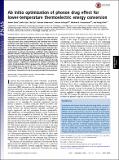| dc.contributor.author | Zhou, Jiawei | |
| dc.contributor.author | Liao, Bolin | |
| dc.contributor.author | Qiu, Bo | |
| dc.contributor.author | Huberman, Samuel C. | |
| dc.contributor.author | Esfarjani, Keivan | |
| dc.contributor.author | Dresselhaus, Mildred | |
| dc.contributor.author | Chen, Gang | |
| dc.date.accessioned | 2017-07-06T17:58:13Z | |
| dc.date.available | 2017-07-06T17:58:13Z | |
| dc.date.issued | 2015-12 | |
| dc.date.submitted | 2015-06 | |
| dc.identifier.issn | 0027-8424 | |
| dc.identifier.issn | 1091-6490 | |
| dc.identifier.uri | http://hdl.handle.net/1721.1/110498 | |
| dc.description.abstract | It has been well known that the phonon drag effect—an extra electrical current induced by phonon heat flow via electron–phonon interaction—can lead to unusually high Seebeck coefficient at low temperatures. However, its use for improving thermoelectric performance has been controversial. Here, using first principles calculations we examine the phonon drag with detailed mode-specific contributions and reveal that even in heavily doped silicon at room temperature, phonon drag can still be significant, which challenges the previous belief that phonon drag vanishes in heavily doped samples. A phonon filter is designed to spectrally decouple the phonon drag from the heat conduction. Our simulation explores the coupled electron phonon transport and uncovers the possibility of optimizing the phonon drag for better thermoelectrics. | en_US |
| dc.description.sponsorship | United States. Department of Energy. Office of Science. Solid-State Solar Thermal Energy Conversion Center (Award DE- SC0001299/DE-FG02-09ER46577) | en_US |
| dc.description.sponsorship | United States. Air Force. Office of Scientific Research. Multidisciplinary University Research Initiative (AFOSR MURI FA9550-10-1-0533) | en_US |
| dc.language.iso | en_US | |
| dc.publisher | National Academy of Sciences (U.S.) | en_US |
| dc.relation.isversionof | http://dx.doi.org/10.1073/pnas.1512328112 | en_US |
| dc.rights | Article is made available in accordance with the publisher's policy and may be subject to US copyright law. Please refer to the publisher's site for terms of use. | en_US |
| dc.source | PNAS | en_US |
| dc.title | Ab initio optimization of phonon drag effect for lower-temperature thermoelectric energy conversion | en_US |
| dc.type | Article | en_US |
| dc.identifier.citation | Zhou, Jiawei, Bolin Liao, Bo Qiu, Samuel Huberman, Keivan Esfarjani, Mildred S. Dresselhaus, and Gang Chen. “Ab Initio Optimization of Phonon Drag Effect for Lower-Temperature Thermoelectric Energy Conversion.” Proc Natl Acad Sci USA 112, no. 48 (November 16, 2015): 14777–14782. | en_US |
| dc.contributor.department | Massachusetts Institute of Technology. Department of Electrical Engineering and Computer Science | en_US |
| dc.contributor.department | Massachusetts Institute of Technology. Department of Mechanical Engineering | en_US |
| dc.contributor.department | Massachusetts Institute of Technology. Department of Physics | en_US |
| dc.contributor.mitauthor | Zhou, Jiawei | |
| dc.contributor.mitauthor | Liao, Bolin | |
| dc.contributor.mitauthor | Qiu, Bo | |
| dc.contributor.mitauthor | Huberman, Samuel C. | |
| dc.contributor.mitauthor | Esfarjani, Keivan | |
| dc.contributor.mitauthor | Dresselhaus, Mildred | |
| dc.contributor.mitauthor | Chen, Gang | |
| dc.relation.journal | Proceedings of the National Academy of Sciences of the United States of America | en_US |
| dc.eprint.version | Final published version | en_US |
| dc.type.uri | http://purl.org/eprint/type/JournalArticle | en_US |
| eprint.status | http://purl.org/eprint/status/PeerReviewed | en_US |
| dspace.orderedauthors | Zhou, Jiawei; Liao, Bolin; Qiu, Bo; Huberman, Samuel; Esfarjani, Keivan; Dresselhaus, Mildred S.; Chen, Gang | en_US |
| dspace.embargo.terms | N | en_US |
| dc.identifier.orcid | https://orcid.org/0000-0002-9872-5688 | |
| dc.identifier.orcid | https://orcid.org/0000-0002-0898-0803 | |
| dc.identifier.orcid | https://orcid.org/0000-0003-0865-8096 | |
| dc.identifier.orcid | https://orcid.org/0000-0001-8492-2261 | |
| dc.identifier.orcid | https://orcid.org/0000-0002-3968-8530 | |
| mit.license | PUBLISHER_POLICY | en_US |
